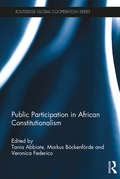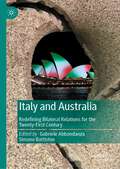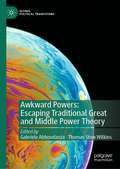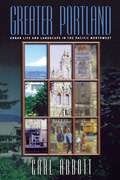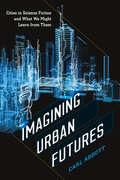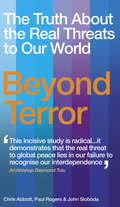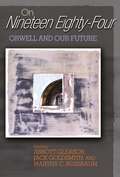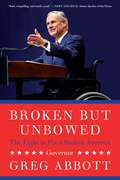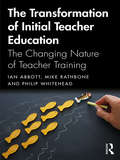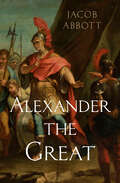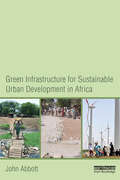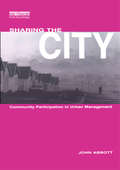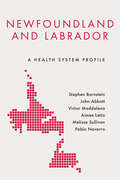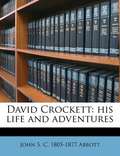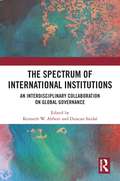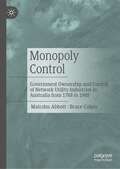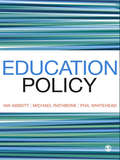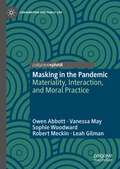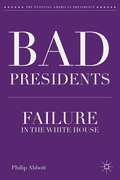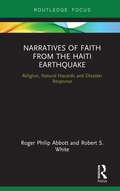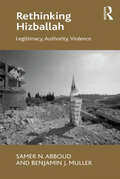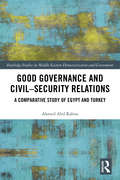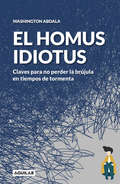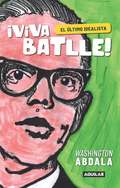- Table View
- List View
Public Participation in African Constitutionalism (Routledge Global Cooperation Series)
by Tania Abbiate Markus Böckenförde Veronica FedericoDuring the last decade of the 20th century, Africa has been marked by a "constitutional wind" which has blown across the continent giving impetus to constitutional reforms designed to introduce constitutionalism and good governance. One of the main features of these processes has been the promotion of public participation, encouraged by both civil society and the international community. This book aims to provide a systematic overview of participation forms and mechanisms across Africa, and a critical understanding of the impact of public participation in constitution-making processes, digging beneath the rhetoric of public participation as being at the heart of any successful transition towards democracy and constitutionalism. Using case studies from Central African Republic, Egypt, Kenya, Libya, Malawi, Morocco, Senegal, Somalia, South Africa, South Sudan, Tanzania, Tunisia, Zambia and Zimbabwe, the book investigates various aspects of participatory constitution making: from conception, to processes, and specific contents that trigger ambivalent dynamics in such processes. The abstract glorification of public participation is questioned as theoretical and empirical perspectives are used to explain what public participation does in concrete terms and to identify what lessons might be drawn from those experiences. This is a valuable resource for academics, researchers and students with an interest in politics and constitution building in Africa, as well as experts working in national offices, international organizations or in national and international NGOs.
Italy and Australia: Redefining Bilateral Relations for the Twenty-First Century
by Gabriele Abbondanza Simone BattistonThis book offers a novel and comprehensive reappraisal of current relations between Italy and Australia. For the first time, it expands the scope of analysis by encompassing and critically reviewing research avenues that have been understudied so far. In order to pursue this objective, it provides innovative analyses on bilateral history, reciprocal migration, socio-cultural ties, international relations and trade, comparative politics, and scientific cooperation.By adopting a multidisciplinary approach, this book makes a significant contribution to multiple disciplinary literatures, benefitting social science scholars, policymakers, and professionals working in a number of fields. Mindful of the wide scope and multidisciplinary nature of this innovative research, the editors oversee a careful balance of different theories, methodologies, sources, and data, in accordance with the conventions of each discipline employed in this volume. As a result, this book encourages a broader and more nuanced understanding of Italian-Australian relations in the 21st century.
Awkward Powers: Escaping Traditional Great and Middle Power Theory (Global Political Transitions)
by Gabriele Abbondanza Thomas Stow WilkinsThis book introduces the editors’ new concept of “Awkward Powers”. By undertaking a critical re-examination of the state of International Relations theorising on the changing nature of the global power hierarchy, it draws attention to a number of countries that fit awkwardly into existing but outdated categories such as “great power” and “middle power”. It argues that conceptual categories pertaining to the apex of the international hierarchy have become increasingly unsatisfactory, and that new approaches focusing on such “Awkward Powers” can both rectify shortcomings on power theorising whilst shining a much-needed theoretical spotlight on significant but understudied states. The book’s contributors examine a broad range of empirical case studies, including both established and rising powers across a global scale to illustrate our conceptual claims. Through such a novel process, we argue that a better appreciation of the de facto international power hierarchy in the 21st century can be achieved.
Greater Portland: Urban Life and Landscape in the Pacific Northwest
by Carl AbbottSelected by Choice magazine as an Outstanding Academic Title for 2001<P><P> It has been called one of the nation's most livable regions, ranked among the best managed cities in America, hailed as a top spot to work, and favored as a great place to do business, enjoy the arts, pursue outdoor recreation, and make one's home. Indeed, years of cooperative urban planning between developers and those interested in ecology and habitability have transformed Portland from a provincial western city into an exemplary American metropolis. Its thriving downtown, its strong neighborhoods, and its pioneering efforts at local management have brought a steady procession of journalists, scholars, and civic leaders to investigate the "Portland style" that values dialogue and consensus, treats politics as a civic duty, and assumes that it is possible to work toward public good.Probing behind the press clippings, acclaimed urban historian Carl Abbott examines the character of contemporary Portland--its people, politics, and public life--and the region's history and geography in order to discover how Portland has achieved its reputation as one of the most progressive and livable cities in the United States and to determine whether typical pressures of urban growth are pushing Portland back toward the national norm.In Greater Portland, Abbott argues that the city cannot be understood without reference to its place. Its rivers, hills, and broader regional setting have shaped the economy and the cityscape. Portlanders are Oregonians, Northwesteners, Cascadians; they value their city as much for where it is as for what it is, and this powerful sense of place nurtures a distinctive civic culture. Tracing the ways in which Portlanders have talked and thought about their city, Abbott reveals the tensions between their diverse visions of the future and plans for development.Most citizens of Portland desire a balance between continuity and change, one that supports urban progress but actively monitors its effects on the region's expansive green space and on the community's culture. This strong civic participation in city planning and politics is what gives greater Portland its unique character, a positive setting for class integration, neighborhood revitalization, and civic values. The result, Abbott confirms, is a region whose unique initiatives remain a model of American urban planning.
Imagining Urban Futures: Cities in Science Fiction and What We Might Learn from Them
by Carl AbbottCarl Abbott, who has taught urban studies and urban planning in five decades, brings together urban studies and literary studies to examine how fictional cities in work by authors as different as E. M. Forster, Isaac Asimov, Kim Stanley Robinson, and China Miéville might help us to envision an urban future that is viable and resilient. Imagining Urban Futures is a remarkable treatise on what is best and strongest in urban theory and practice today, as refracted and intensely imagined in science fiction. As the human population grows, we can envision an increasingly urban society. Shifting weather patterns, rising sea levels, reduced access to resources, and a host of other issues will radically impact urban environments, while technology holds out the dream of cities beyond Earth. Abbott delivers a compelling critical discussion of science fiction cities found in literary works, television programs, and films of many eras from Metropolis to Blade Runner and Soylent Green to The Hunger Games, among many others.
Beyond Terror: The Truth About the Real Threats to Our World
by Chris Abbott John Sloboda Paul RogersIs international terrorism really the single greatest threat to world security?Since the 9/11 attacks, many Western governments assume terrorism to be the greatest threat we face. In response, their dangerous policies attempt to maintain control and keep the status quo by using overwhelming military force. This important book shows why this approach has been such a failure, and how it distracts us from other, much greater, threats of climate change, competition over resources, marginalisation of the majority of the world and global militarisation.Unless urgent, coordinated action is taken in the next 5-10 years on all these issues it will be almost imossible to avoid the earth becoming a highly unstable place by the middle years of this century. Beyond Terror offers an alternative path for politicians, journalists and concerned citizens alike.
On Nineteen Eighty-Four: Orwell and Our Future
by Abbott Gleason, Jack Goldsmith, and Martha C. NussbaumGeorge Orwell's Nineteen Eighty-Four is among the most widely read books in the world. For more than 50 years, it has been regarded as a morality tale for the possible future of modern society, a future involving nothing less than extinction of humanity itself. Does Nineteen Eighty-Four remain relevant in our new century? The editors of this book assembled a distinguished group of philosophers, literary specialists, political commentators, historians, and lawyers and asked them to take a wide-ranging and uninhibited look at that question. The editors deliberately avoided Orwell scholars in an effort to call forth a fresh and diverse range of responses to the major work of one of the most durable literary figures among twentieth-century English writers. As Nineteen Eighty-Four protagonist Winston Smith has admirers on the right, in the center, and on the left, the contributors similarly represent a wide range of political, literary, and moral viewpoints. The Cold War that has so often been linked to Orwell's novel ended with more of a whimper than a bang, but most of the issues of concern to him remain alive in some form today: censorship, scientific surveillance, power worship, the autonomy of art, the meaning of democracy, relations between men and women, and many others. The contributors bring a variety of insightful and contemporary perspectives to bear on these questions.
Broken But Unbowed
by Greg AbbottTexas governor and rising star in the Republican Party--one of the first prominent politicians to govern from a wheelchair since Franklin D. Roosevelt--Governor Greg Abbott pens his deeply personal and inspiring life story and proposes a plan to restore America to greatness in what Newt Gingrich calls a "bold and compelling" read.Texas Governor Greg Abbott lost his ability to walk when a huge oak tree crashed down on his back, fracturing vertebrae into his spinal cord, leaving him forever paralyzed. At twenty-six years old, he felt that the future he had dreamed of was gone. But he soon realized that our lives are not defined by our challenges, but by how we respond to them. He went on to overcome his paralytic limitations to become the longest-serving attorney general in Texas history and now governor, all while in a wheelchair. Greg Abbott waged a record number of legal challenges against the federal government that has come unhinged from the Constitution. He also led legal battles to defend the Second Amendment, the Tenth Amendment, and religious liberty. He personally appeared before the U.S. Supreme Court to defend the Ten Commandments monument on the Texas Capitol Grounds--and won. Through these fights he realized that his personal story held an important parallel to America's current challenges. The Constitution that forms the foundation of our country has been broken, but the people of this nation remain determined to achieve American greatness. Abbott explains that it is up to us to restore America to its rightful luster and power in the world, emerging triumphant from our stumbles. In Broken but Unbowed, Governor Abbott describes firsthand what it was like to be on the battlefield in the historic fights that have refined the Constitution and the lessons he's learned along the way, offering solutions that will bring us back a government that lives up to the American Dream.
The Transformation of Initial Teacher Education: The Changing Nature of Teacher Training
by Ian Abbott Mike Rathbone Philip WhiteheadTracing the development of initial teacher education since the large-scale expansion of the teaching profession after the Second World War to the present day, The Transformation of Initial Teacher Education explores the changing nature of teacher training. Examining the growth of the ‘teaching industry’, this book addresses key issues including: the return to an apprentice model the growing importance of schools in initial teacher training the continuing decline in the role played by higher education an examination of the broader socio-economic context of increased marketisiation a reconsideration of the international political factors driving the reform process; and interviews with prominent individuals who have been involved with the development of policy Considering the ideas and ideals that have permeated teacher education and how these have shaped the experiences of trainees on a variety of programmes across a broader international context, this book examines the future of teacher education and the changing nature of teaching, providing essential insight for trainee teachers, school staff and any academics involved in teacher education.
Alexander the Great
by Jacob AbbottJacob Abbott gave us the opportunity to plunge past. To step back in time a read about a man who had such an impact of the world. The author takes you into the tent of Alexander and you can see with his eyes that very way to the top. The author in detail show chronological events of Alexander, right from his birth to his death.
Green Infrastructure for Sustainable Urban Development in Africa
by John AbbottThis book shows for the first time how green infrastructure can work in an African urban context. On one level it provides a major rethinking of the role of infrastructure in urban society since the creation of networked infrastructure in the early twentieth century. On another, it explores the changing paradigms of urban development through the fundamental question of how decisions are made. With a focus on Africa's fast-growing secondary towns, where 70 per cent of the urban population live, the book explains how urban infrastructure provides the key to the relationship between economic development and social equity, through the mediation of natural resources. Adopting this view enables investment to be channelled more effectively to provide the engine for economic growth, while providing equitable services for all residents. At the same time, the mediation of resource flows integrates the metabolism of the city into the wider ecosystem. This vision leads to a new way of thinking about infrastructure, giving clear definition to the concept of green infrastructure. On the basis of research gathered throughout an extensive career, John Abbott draws in particular from his experience in Ethiopia to demonstrate the ways in which infrastructure needs to respond to the economies, societies and natural environments of twenty-first century urban Africa.
Sharing the City: Community Participation in Urban Management
by John AbbottWhile the rate of urbanisation in the developing world has increased dramatically over the past 20 years, governments' capacity to support urban growth has, in many cases, failed to keep up with this trend. Non-governmental organisations working in the field have long advocated community management of the urban environment as the best solution to this problem, and there is now a growing consensus that the answer does, indeed, lie with local communities. Yet there is still little understanding of what constitutes meaningful and effective community participation, or how it may be achieved in such a complex operating environment. Sharing the City gives a comprehensive account of urban community participation, both in theory and practice. It first presents a wide-ranging analysis of the issues, and develops a participatory framework for urban management. Using case studies and existing examples from around the world, and drawing on lessons learned from previous experience, it then develops the theory into a practical working model. Effective participatory urban management calls for a fundamental rethink on the part of all the actors involved - from local authorities and development agencies, through local and international NGOs, to the community-based organisations and the communities themselves. In redefining their roles and relationships, Sharing the City presents a new and radically different, yet viable and effective, approach to the concept of urban management.
Newfoundland and Labrador: A Health System Profile (Provincial and Territorial Health System Profiles)
by John Abbott Stephen Bornstein Victor Maddalena Aimee Letto Melissa Sullivan Pablo NavarroThere is not, and has never been, a single Canadian health system. Part of a series on the health systems of Canada’s provinces and territories, Newfoundland and Labrador: A Health System Profile provides a critical analysis of how the single-payer health care system has been implemented in the country’s youngest province. Examining the way the province’s health services are organized, funded, and delivered, the authors focus on the challenges involved in providing effective health care in a setting characterized by a large, decentralized territory; a small population, much of which is widely distributed in a large number of rural communities and small towns; and comparatively limited fiscal capacity and health human resources. Drawing on maps, figures, and collected data, this book documents the hesitant and limited ways in which Newfoundland and Labrador has sought to deal with the challenges and difficulties that the system has experienced in responding to recent changes in demography, economics, and medical technology.
David Crockett: His Life and Adventures
by John S. C. AbbottDAVID CROCKETT: His Life and Adventures by John S. C. Abbott might be the most accurate book you’ll ever read about this great American icon. Throughout the book, Crockett speaks to you in his own words and relates his amazing story.
The Spectrum of International Institutions: An Interdisciplinary Collaboration on Global Governance
by Kenneth W. Abbott Duncan SnidalThis book collects and integrates Abbott and Snidal’s influential scholarship on indirect global governance, with a new analytical introduction that probes the role of indirect governance techniques in the universe of global governance arrangements. The volume presents the Governance Triangle, a now widely-used figure that demonstrates and helps to assess the proliferation of private and public-private standard-setting organizations, along with new forms of intergovernmental institutions, over recent decades. It then analyzes how intergovernmental organizations, regulatory bodies, and other "global governors" enlist and work through those organizations as intermediaries, so as to govern more effectively and gain knowledge, influence and legitimacy. It demonstrates Abbott’s and Snidal’s groundbreaking concept of orchestration, a mode of indirect governance in which influential governors catalyze, support, and steer intermediary organizations through wholly voluntary relationships. It also considers their more recent innovations in the theory of indirect governance. These include additional modes of governance, such as co-optation, delegation and trusteeship, as well as the pervasive "Governor’s Dilemma" trade-off between a governor’s control of its intermediaries and the intermediaries’ competence. This book will appeal to scholars and students in multiple disciplines, including international relations, global governance, law, and regulatory studies.
Monopoly Control: Government Ownership and Control of Network Utility Industries in Australia from 1788 to 1988
by Malcolm Abbott Bruce CohenThis book traces the historical development of the network utilities sector in Australia (communications, rail, gas, electricity, water supply, and sewerage services). It looks across industries, time periods and the state and federal jurisdictions, to identify what motivated the various governments to establish these enterprises and what issues arose. The book is therefore informed by the relationship between politics and society on the one hand and economic history on the other; as well as the efforts of governments in Australia to promote economic growth and the wealth of Australians. The main focus of the book is to identify and analyse the following two main questions: (i) What were the main drivers and motivations for governments establishing government-owned business in the network utilities sector? (ii) To what degree were these government-owned businesses successful at achieving the aims of these governments? In doing so the inherent characteristics of these industries are identified, in terms of their need for rights of way, network effects, the monopoly characteristics, and the potential for stimulating growth.
Education Policy
by Mr Ian Abbott Phillip Whitehead Michael Rathbone'A splendid read. Via interviews with several Secretaries of State for Education and a supporting analytical commentary, Education Policy provides a fascinating insight and historical appraisal of English policy rationale'-Dr David Kitchener, Reader in Education, University of Bolton 'This book should be compulsory reading, not only for people interested in the history of education policy but also for policy makers, to remind them of what has gone before'-Dr Andrew Townsend, University of Nottingham From Butler to Balls and beyond, this essential book illuminates educational issues in England and Wales since WWII, drawing on extensive documentary evidence. Inside you will find in-depth interviews with former Secretaries of State for Education and other key decision-makers, including: - Ed Balls - David Blunkett - Michael Gove - Alan Johnson - Ruth Kelly The interviews cover the historical context of their period of office and the lasting legacy of their policies. This is a must-read for Masters-level students on Education courses and PGCE programmes, and will be valuable to undergraduates studying modern history and social policy. Ian Abbott is Director of the Warwick Institute of Education. Mike Rathbone was previously Director of Continuing Professional Development in the Institute of Education. Phil Whitehead is the course leader for the secondary PGCE (Teach First). All are at the University of Warwick.
Masking in the Pandemic: Materiality, Interaction, and Moral Practice (Consumption and Public Life)
by Owen Abbott Vanessa May Sophie Woodward Robert Meckin Leah GilmanThis book assumes an “everyday life” perspective towards masking in public spaces in the UK during the Covid-19 pandemic. Facemasks are perhaps one of the most tangible ways in which the changes wrought by the Covid-19 pandemic were made visible. In the space of a few months in 2020, masking in the UK went from being almost non-existent in public to becoming widespread, both before and after the UK government mandated masking in most enclosed public spaces in July 2020. In this context, the speed and scale of the introduction of masking in public settings offers sociologists a rare chance to document the (contested) emergence of a new social practice. We argue that the nature of masking during the pandemic means that masking practices need to be understood through the entwinement of material, interactional, and moral dimensions. We develop a relational perspective to explore the relationship between the materiality and moral significance of masking, and how this translated into the development of masking practices in public spaces. The authors argue further that the specific context of masking during the pandemic provides sociologists with a unique lens to think through the nature of material, interactional, and moral practices in general.
Bad Presidents
by Philip AbbottGeorge Washington, Abraham Lincoln, and Franklin Delano Roosevelt are always at the top of presidential rankings. But what about those presidents who consistently appear at or near the bottom of these lists? Based on the insights found in Shakespeare's treatment of two bad kings, Abbott identifies two kinds of bad presidents and examines the case for including eleven in this category. In each case study, from John Tyler to Richard Nixon (and possibly George W. Bush), he finds a tipping point that places them in this unenviable category. Abbott concludes by discussing why we elected these bad presidents in the first place and how we might avoid adding future bad presidents to the list.
Narratives of Faith from the Haiti Earthquake: Religion, Natural Hazards and Disaster Response (Routledge Focus on Religion)
by Roger Philip Abbott Robert S. WhiteThis book presents an in-depth ethnographic case study carried out in the years following the 2010 Haiti earthquake to present the role of faith beliefs in disaster response. The earthquake is one of the most destructive on record, and the aftermath, including a cholera epidemic and ongoing humanitarian aid, has continued for years following the catastrophe. Based on dozens of interviews, this book gives primacy to survivors’ narratives. It begins by laying out the Haitian context, before presenting an account of the earthquake from survivors’ perspectives. It then explores in detail how the earthquake affected the religious, mainly Christian, faith of survivors and how religious faith influenced how they responded to, and are recovering from, the experience. The account is also informed by geoscience and the accompanying "complicating factors." Finally, the Haitian experience highlights the significant role that religious faith can play alongside other learned coping strategies in disaster response and recovery globally. This book contributes an important case study to an emerging literature in which the influence of both religion and narrative is being recognised. It will be of interest to scholars of any discipline concerned with disaster response, including practical theology, anthropology, psychology, geography, Caribbean studies and earth science. It will also provide a resource for non-governmental organisations.
Rethinking Hizballah: Legitimacy, Authority, Violence
by Samer N. Abboud Benjamin J. MullerInternational Relations scholarship posits that legitimacy, authority and violence are attributes of states. However, groups like Hizballah clearly challenge this framing of global politics through its continued ability to exercise violence in the regional arena. Surveying the different and sometimes conflicting interpretations of state-society relations in Lebanon, this book presents a lucid examination of the socio-political conditions that gave rise to the Lebanese movement Hizballah from 1982 until the present. Framing and analysing Hizballah through the perspective of the 'resistance society'; an articulation of identity politics that informs the violent and non-violent political strategies of the movement, Abboud and Muller demonstrate how Hizballah poses a challenge to the Lebanese state through its acquisition and exercise of private authority, and the implications this has for other Lebanese political actors. An essential insight into the complexities of the workings of Hizballah, this book broadens our understanding of how legitimacy, authority and violence can be acquired and exercised outside the structure of the sovereign nation-state. An invaluable resource for scholars working in the fields of Critical Comparative Politics and International Relations.
Good Governance and Civil–Security Relations: A Comparative Study of Turkey and Egypt (Routledge Studies in Middle Eastern Democratization and Government)
by Ahmed Abd RabouDeveloping the traditional civil-military relations approach to include security actors, the book compares the style of civil-security relations in both Egypt and Turkey. The volume comprehends the competition between civilian actors and military and security actors to impose control over the political regimes in transition and how this is related to the issue of good governance and democratization. The Egyptian and Turkish cases are viably comparable in terms of the status of civil-security relations and level of civilian control, specifically considering the different outcomes of the latest military putsches in both country (2013 in Egypt and 2016 in Turkey), and the extended experiences of both countries with a strong military influence and presence in politics. The different responses of the Egyptian and Turkish publics to the coup attempts invite an interesting comparison, especially given that in both cases, the public was the decisive factor in the success or failure of the coup. Focusing on civil-security relations within the broader context of good governance and democracy in Egypt and Turkey this book will be a key resource for students and scholars interested in political science, specifically comparative government studies and Middle East studies.
El homus idiotus
by Washington AbdalaDecir que vivimos en tiempos convulsionados es noticia de ayer. Estamos navegando sin brújula en un océano de información, expuestos a las agresiones del marketing extremista, indefensos ante un entorno que desconocemos o apenas comprendemos, aferrados al teléfono móvil como única vía de contacto con el otro. En este escenario cambiante e incierto, Washington Abdala nos invita a reflexionar sobre nosotros mismos y el vértigo en el que transcurre nuestra vida. Los relatos que orientaban nuestros vínculos en sociedad han cambiado dramáticamente, pero ¿han sido sustituidos por otros más adecuados? Las redes virtuales como espacio de socialización, la información que nos llega en exceso, pero no se convierte en conocimiento, la banalización de la oposición de ideas, la búsqueda de la aprobación a cualquier costo, la glorificación de la juventud, las grandes superficies como ideal del entretenimiento, son fenómenos que desfilan ante nuestros incrédulos ojos, cuestionándonos como sociedad y como individuos. Con un estilo atrapante, vertiginoso y empático, Abdala nos desafía a acompañarlo en un recorrido por nuestra cotidianidad, y nos alienta a tomar distancia y mirarla con ojos más críticos.
Viva Batlle!: El último idealista
by Washington AbdalaJorge Batlle fue un líder diferente. Su inclaudicable voluntad siempre estuvo al servicio de ideales trascendentes. A lo largo de su vida recogió innumerables adhesiones, y también algunos adversarios, pero nunca resultó indiferente a nadie. Atravesó tormentas con la fuerza de sus convicciones, y dejó una huella imborrable en todos quienes estuvieron cerca de él. Uno de ellos fue Washington Abdala, el autor de este libro que también es un homenaje. ¿Cómo era realmente Jorge Batlle? ¿Qué pensaban de él quienes lo acompañaron a lo largo de la vida? ¿Cómo lo veían sus correligionarios, la prensa, sus familiares, sus amigos, sus adversarios? ¿Cuáles fueron sus ideas más poderosas? A través de estas páginas, Abdala investiga y recoge una polifonía de voces que iluminan la figura de Batlle desde los más diversos ángulos, logrando un mosaico que nos permite conocer mejor a una de las personalidades políticas más relevantes del Uruguay del siglo XX.
